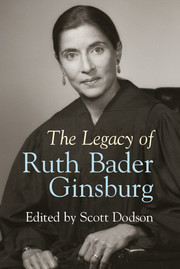Book contents
- Frontmatter
- Contents
- Contributors
- Preface
- Acknowledgments
- Part I Shaping a Legacy
- 1 Notes on a Life
- 2 Ruth Bader Ginsburg
- 3 Before Frontiero There Was Reed
- 4 Struck by Stereotype
- A Postscript to Struck by Stereotype
- 5 Beyond the Tough Guise
- Part II Rights and Remedies
- Part III Structuralism
- Part IV The Jurist
- Notes
- Index
A Postscript to Struck by Stereotype
Published online by Cambridge University Press: 05 February 2015
- Frontmatter
- Contents
- Contributors
- Preface
- Acknowledgments
- Part I Shaping a Legacy
- 1 Notes on a Life
- 2 Ruth Bader Ginsburg
- 3 Before Frontiero There Was Reed
- 4 Struck by Stereotype
- A Postscript to Struck by Stereotype
- 5 Beyond the Tough Guise
- Part II Rights and Remedies
- Part III Structuralism
- Part IV The Jurist
- Notes
- Index
Summary
Reading the account of Captain Susan Struck’s case, vibrantly told by Neil S. Siegel and Reva B. Siegel, brought me back to the summer of 1972. ACLU Legal Office staff counsel Joel M. Gora and I spent many hours in June and July of that year preparing a petition for certiorari, one we hoped would engage the Court’s attention. In the preceding year, the ACLU had taken on, along with Struck, several other cases challenging the rule, then maintained by all the Armed Forces, requiring pregnant service members to choose between abortion and ouster from the military. But Captain Struck’s case was our frontrunner. We aimed to present the issue of reproductive choice through her eyes and experience. Captain Struck chose birth, but her Government made that choice a mandatory ground for discharge. We filed the petition on July 31, 1972 and were elated that fall, when the Court, on October 24, granted certiorari.
From the end of October until December 4, when we filed our brief on the merits, the full presentation of Captain Struck’s case was my principal project. But as if synchronized, the Air Force waived Captain Struck’s discharge on the eve of our submission. It was the right decision for the Air Force, and good news for Captain Struck and other service members caught in the same bind. But an ideal case to argue the sex equality dimension of laws and regulations governing pregnancy and childbirth had slipped from our grasp.
- Type
- Chapter
- Information
- The Legacy of Ruth Bader Ginsburg , pp. 57 - 58Publisher: Cambridge University PressPrint publication year: 2015
- 1
- Cited by



